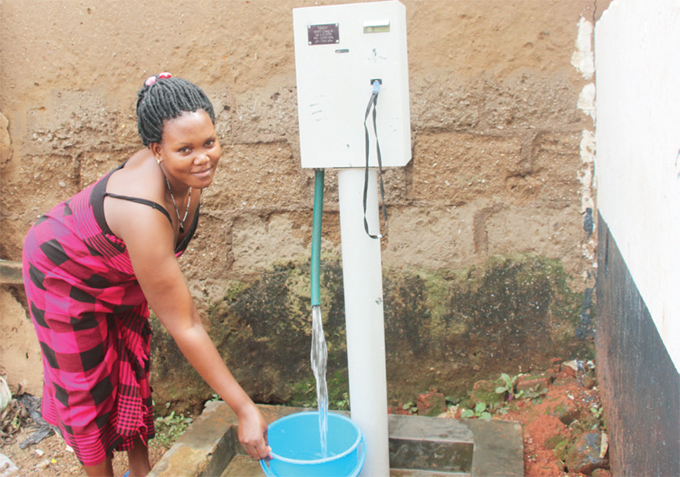Press release: The Water Gap report released
Access to water for all will ensure progressive realisation of Uganda’s development aspirations - WaterAid
The quest for a middle income status for Uganda by 2020 and achieving the UN Sustainable Development Goals by 2030 remain a far cry from reality if access to clean water for everyone is not made a priority, WaterAid has said.
The SDGs implore governments, including Uganda, to improve service standards to reach everyone everywhere.
This world water day 22 March 2018, WaterAid releases its State of the World's Water 2018: the Water Gap revealing that more than 23million Ugandans are still unable to get clean water within a half hour round trip.
According to the report, Uganda ranks third lowest in access to water on premises or close to home, within a 30 - minute round trip, with Papua New Guinea and Eritrea trailing. The poor are comparatively worse off with only 35% having access to clean water close to home, while 72% of the wealthy do.
"While the 38% water coverage so far achieved is commendable progress, it is urgent that our government takes action beyond the statistics to ensure that every person in this country, even the poor and most marginalised especially the women and girls enjoy the right to clean water at all times, leaving no one behind," says Francis Musinguzi, Country Director WaterAid Uganda.
Today 844 million people globally do not have clean water. In many developing countries including Uganda, Niger, Mozambique and India, limited access has been compounded by pressures from urbanisation, population growth, shock weather events and poor financing and prioritisation of water services.
"Due to climate change, water, our most precious resource, is increasingly under threat. Those marginalised by age, gender, class, caste or disability, or living in a slum or remote rural community continue to suffer poverty, disease and food insecurity due to limited funding and low prioritisation of water service delivery," adds Musinguzi.
 A woman uses a pre-paid meter in front of her rented home in a slum at Kibuye - Makindye in Kampala; she can buy water credit for as low as Ugx.500 and spends only Ugx.25 for every 20L jerrycan of water. In slum areas where this system has not yet been installed, it is not uncommon to find landlords inflating the price per unit to unsuspecting tenants. WaterAid promotes customer segmentation and cross subsidisation of water tariff as pro-poor policy measures to close accessibility and affordability gaps.
A woman uses a pre-paid meter in front of her rented home in a slum at Kibuye - Makindye in Kampala; she can buy water credit for as low as Ugx.500 and spends only Ugx.25 for every 20L jerrycan of water. In slum areas where this system has not yet been installed, it is not uncommon to find landlords inflating the price per unit to unsuspecting tenants. WaterAid promotes customer segmentation and cross subsidisation of water tariff as pro-poor policy measures to close accessibility and affordability gaps.
Globally, the number of people living in water stress is expected to increase beyond the current 60%, with extreme weather brought by climate change, urbanisation, industrialisation and the simple ever-increasing demand for water.
The Water Gap report comes as nations prepare a 2018 review of the United Nations' Sustainable Development Goal 6, to deliver water and sanitation to everyone, everywhere by 2030.
The findings of the report and analyses from WaterAid's work around the world compels the call to action by governments for without adequate financing and political priority, national, regional and international commitments remain a dream.
WaterAid's Chief Executive, Tim Wainwright, said: "It's deplorable that every year nearly 300,000 children die before their fifth birthday from diarrhoeal illnesses caused by dirty water, lack of decent toilets and poor hygiene. This year ahead of the July 2018 review of progress towards UN Sustainable Development Goal 6 in New York, we urge world leaders to take real action to deliver access to water and sanitation for all by 2030, because without these, none of the other Global Goals - alleviating poverty, improving health and creating a fairer and more sustainable world - will be achievable."
This World Water Day, WaterAid is calling for:
· Recognition that the UN Global Goals are everyone's responsibility to deliver, to ensure no one is left behind.
· Responsible environmental management, including regulating the use of water in agriculture and industry, to protect and preserve enough clean water for communities' basic needs.
· Including access to water, sanitation and hygiene as central to health, education, nutrition and gender equality. Without water, none of the other UN Global Goals can be met.
· Urgent action on the ground, at regional, national and global scale. Access to safe drinking water is a UN-recognised human right: politicians need to prioritise it and fund it, civil society must empower people to speak out for their rights, and business entrepreneurs in water, sanitation and hygiene must work together to support service providers and government to respond.
· Mobilising resources from taxes, tariffs and transfers, and increasing the amount and proportion of aid for water, sanitation and hygiene, to close the gaps in financing. This also means supporting institutions to ensure they are accountable and well-governed, so that money is well-spent, and promoting pro-poor policies that ensure access to water for everyone.